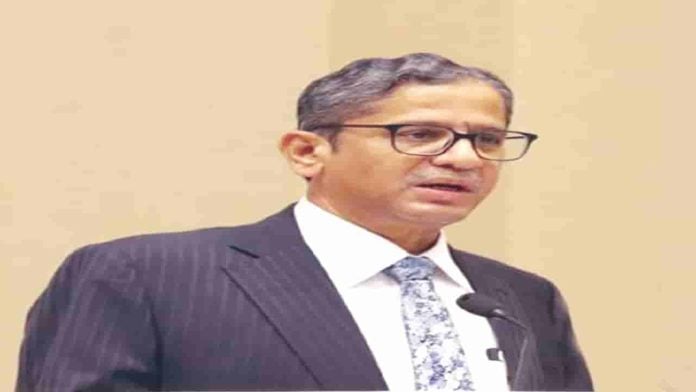Chief Justice N.V. Ramana on Tuesday launched a book titled “The Gita Vijnana Upanishad,” authored by Gulab Chand Kothari.
Speaking on the occasion, the CJI said “Persons belonging to any generation can find relevant answers from the Gita in times of dilemma.
As per Ramana, “In the Courts, we often get to see witnesses taking oath on Bhagwad Gita. It is said that reading the Gita is equal to reading all scriptures. Mahatma Gandhi considered Gita to be his eternal mother.
“India is home to mythology. Even in this modern era, India continues to be the hub of spiritualism. In fact, just the Bhagawad Gita is enough to show how great our country is.
Quoting Father of the Nation Mahatma Gandhi, CJI Ramana said, “I confess to you that when doubts haunt me, when disappointments stare me in the face, and when I see not one ray of light on the horizon, I run to the Bhagavad Gita and find a verse to comfort me, and I immediately begin to smile in the midst of overwhelming sorrow.”
He further said, “Gita captures the essence of human existence and the complexity of making choices. Often, when we are stuck while making decisions, we tend to look for short-term goals and miss the bigger picture.
“The book shows humans to be fallible and imperfect and urges them to take a leap of faith,” he added.
Quoting from Gita, the CJI said, “I would like to share a much-discussed and interpreted quote from the Gita.
‘karmaṇy-evādhikāras te mā phaleṣhu kadāchana.’
“Doing one’s duty, and doing it well, is essential to lead a fulfilling life. The twin concepts of dharma and karma capture the soul of Gita. Our karma alone is in our control.
“Often, miseries in our life do not simply stem from our actions, but from the motivations behind these actions. Expectation of a certain return is what leads to disappointment. But lack of expectations should not lead to inaction,” he added.
“The teachings in Gita transcend the boundaries of religion, time, and age. The fundamentals of true religion are compassion and righteousness. Our religious books teach us about the essential virtues of human existence.
As per CJI Ramana, “Gita teaches us the value of a benevolent heart, the spirit of service and respect and consideration for fellow human beings. It is extremely important to ensure that our children imbibe strong moral values.
“In modern society, all information is at our fingertips. It is necessary to remain grounded to some ethical and moral core. This ethical or moral core of values will ensure that regardless of our situation, we will be guided towards the right course of action,” he added.
According to the CJI, “I will not deny that one can find such a core set of values from a variety of sources, such as philosophy, theology or even literature. Gita is one such fountain of knowledge.
“Each chapter has some guiding principle, from which I am sure a keen reader can find contemporary relevance and meaning. Several movements and leaders have found their inspiration and direction from the Bhagawad Gita. Gandhiji was inspired by the philosophy of service portrayed in the Gita. It is a timeless gift of knowledge for humanity.
The teachings of Gita are eternal. I appreciate the effort of author Gulab Chand Kothari ji in attempting to interpret and analyse this book in Hindi. It is extremely important to inculcate the habit of reading books, as it allows us to understand ourselves and the world around us better. In this digital era,
people, especially the youth of this country, have almost stopped reading,” he added.
The CJI quoted a saying, “reading is to the mind, what exercise is to the body”. However, it is equally important for us to critically engage with the texts we read, the people who write them, and refuse to blindly accept the information that we encounter.
He said a well-informed and rational citizenry was crucial for healthy development of the nation.
As per Ramana, “Before going back to the university to study law, I worked as a journalist. I used to travel by public transport for news coverage. There was
healthy competition among journalists to do great public interest stories.
“After taking risks and putting in a lot of hard work and energy, a brilliant story filed by a journalist is killed at the desk. It is thoroughly demoralising for a genuine journalist. You cannot blame him or her, if they encounter such situations repeatedly and lose faith in the profession.
“Promoting quality journalism through such awards is commendable. But there is still a huge lacuna when it comes to systemic support for journalists in India.
Unfortunately, we still do not have an award which is comparable to the Pulitzer, and neither do we produce many Pulitzer winning journalists in India. I urge upon all the stake holders to introspect as to why our standards are not considered good enough for international recognition and laurels,” he added.


